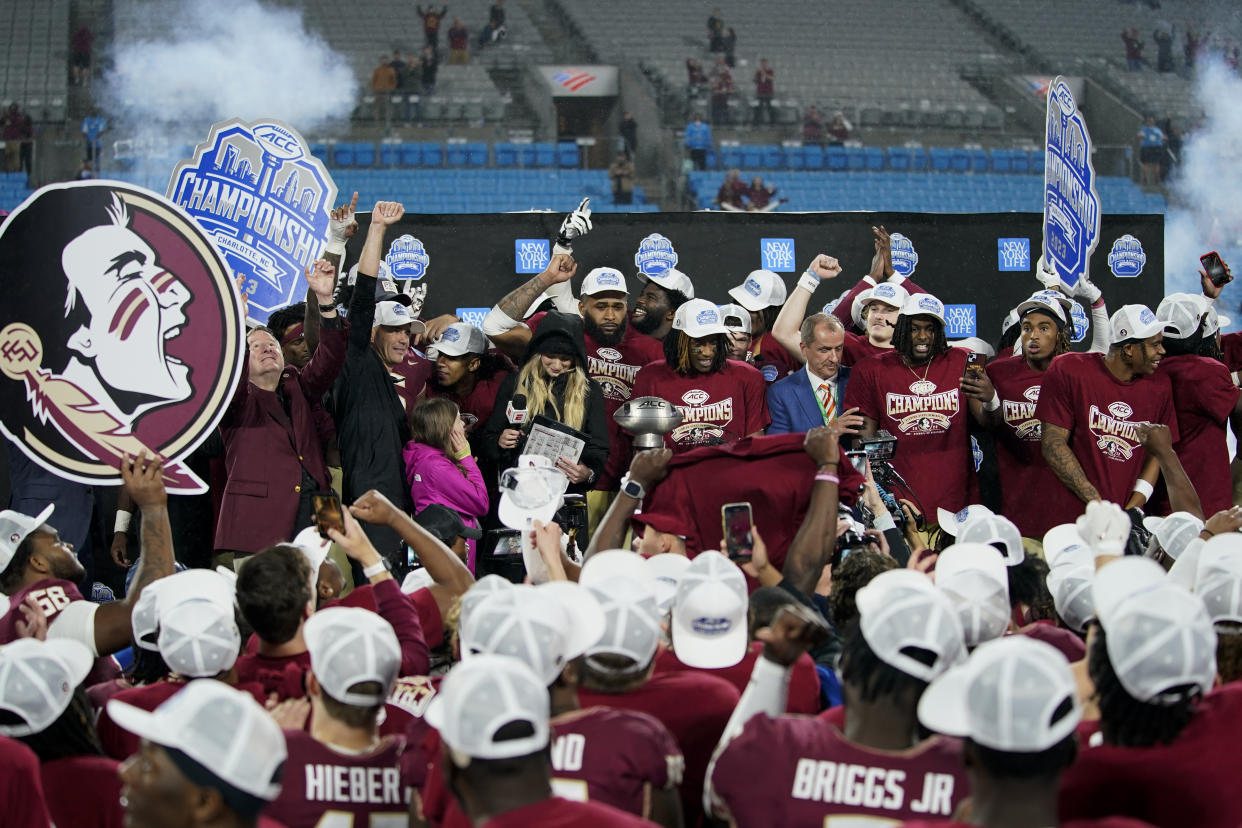Florida AG launches antitrust investigation after FSU football snub

- Oops!Something went wrong.Please try again later.
TALLAHASSEE, Florida — Florida’s attorney general is launching an antitrust investigation into the decision to leave Florida State University out of the upcoming College Football Playoff, marking an escalation of the still-raging controversy over FSU’s snubbing.
Attorney General Ashley Moody sent on Tuesday a civil investigative demand letter to the College Football Playoff, the organization that administers the playoffs and ultimately determined that FSU couldn’t compete in it despite an undefeated regular season. Moody’s office wants a long list of documents and information, including all communications with the Atlantic Coast Conference, the Southeastern Conference and sports media outlet ESPN.
“I’m a lifelong Gator, but I’m also the Florida attorney general, and I know injustice when I see it,” Moody said in a statement shared first with POLITICO. Moody is a graduate of FSU’s arch-rival the University of Florida. “No rational person or college football fan can look at this situation and not question the result. The NCAA, conferences, and the College Football Playoff Committee are subject to antitrust laws.”
Moody, who is the state’s top legal official, has the authority to launch antitrust investigations and the power to take legal action against companies, organizations and individuals alleged to have committed state or federal antitrust actions. She said the investigation would examine if the selection committee was involved in “any anticompetitive conduct.”
“As it stands, the committee’s decision reeks of partiality, so we are demanding answers — not only for FSU, but for all schools, teams and fans of college football,” Moody said. “In Florida, merit matters. If it’s attention they were looking for, the committee certainly has our attention now.”
The letter sent to the committee says the investigation will look at "possible contracts, combinations or conspiracies in restraint of trade, or monopolization, attempted monopolization or commerce, relating to anticompetitive effects of the College Football playoffs on the Group of Five Conferences and Power Five Conferences." There are 10 primary conferences at the top level of college football, including conferences such as the ACC and SEC that are part of the "Power 5."
“We will carefully review this demand for information, but it sure seems to be an overly aggressive reaction to a college football ranking in which some fans somewhere were bound to be disappointed," said Bill Hancock, executive director of the College Football Playoff.
Dennis Schnittker, assistant vice president for university communications at FSU, said "we look forward to the outcome of [Moody's] inquiry.”
FSU went 13-0 this past season, including winning the ACC championship game. But the Seminoles became the first undefeated team from a “Power 5” conference to be denied a chance to play in the four-team playoff. The selection committee earlier this month announced that it had chosen two one-loss teams — Texas and Alabama — ahead of the Seminoles.
The decision enraged the FSU fan base because the head of the selection committee said that the decision was based in part on the injury of FSU’s star quarterback. Many Florida politicians — including Gov. Ron DeSantis and GOP Sen. Rick Scott — have come to FSU’s defense. Some have questioned if there was pressure to include Alabama from the SEC since the conference recently inked a $3 billion television contract with ESPN, the cable network that broadcasts the playoff games.
DeSantis, while acknowledging that there’s little that could be done ahead of the two playoff games scheduled for New Year’s Day, recommended $1 million in his proposed budget in case of potential litigation. Scott sent his own letter on U.S. Senate letterhead asking that the selection committee turn over information. Scott said in a social media post on Monday that he had not gotten a response.
“If they truly feel they made the best decision, why can’t they be transparent? What are they afraid of?” Scott said.
Politicians from other states, such as Sen. Tommy Tuberville (R-Ala.), have pushed back against the complaints of Florida officials, as have many top television celebrities on ESPN. Tuberville, a former college football coach who guided Auburn to an undefeated season, told The Hill it was a “waste of time” to demand that the selection committee turn over records.
FSU’s season included wins over two SEC teams, Louisiana State and University of Florida, as well as wins over ACC rivals Clemson and Miami. The team’s quarterback, Jordan Travis, suffered a season-ending leg injury in mid-November. FSU still defeated the Florida Gators a week later with a backup quarterback and earned the number four spot in the penultimate playoff rankings. The team, however, was forced to turn to its third-string quarterback in the championship game against Louisville.
After the win, however, the selection committee dropped FSU after Alabama defeated reigning national champion Georgia in the SEC championship. Alabama had lost earlier in the season to Texas, which the committee put in at the third spot.
Moody has demanded that the selection committee turn over all documents no later than Jan. 11 but as soon as Dec. 26. The lengthy request not only asks for communications exchanged between the committee and the NCAA, ESPN and conferences, but also documents such as vote sheets and details on financial guarantees. Florida’s attorney general is also seeking any recordings or audio of meetings and information on compensation paid to committee members.

